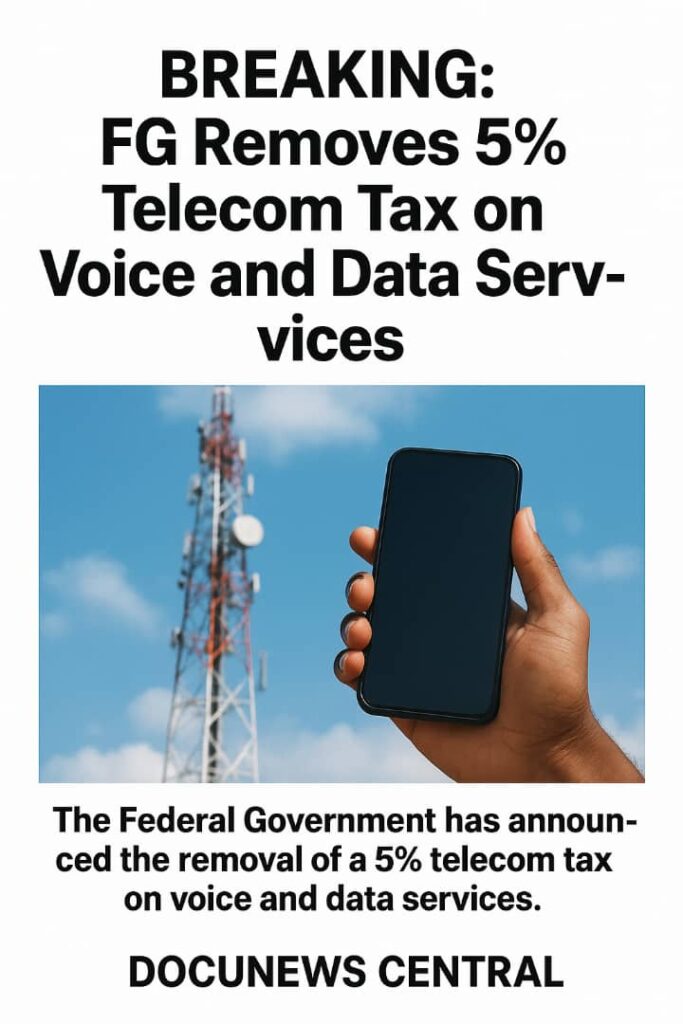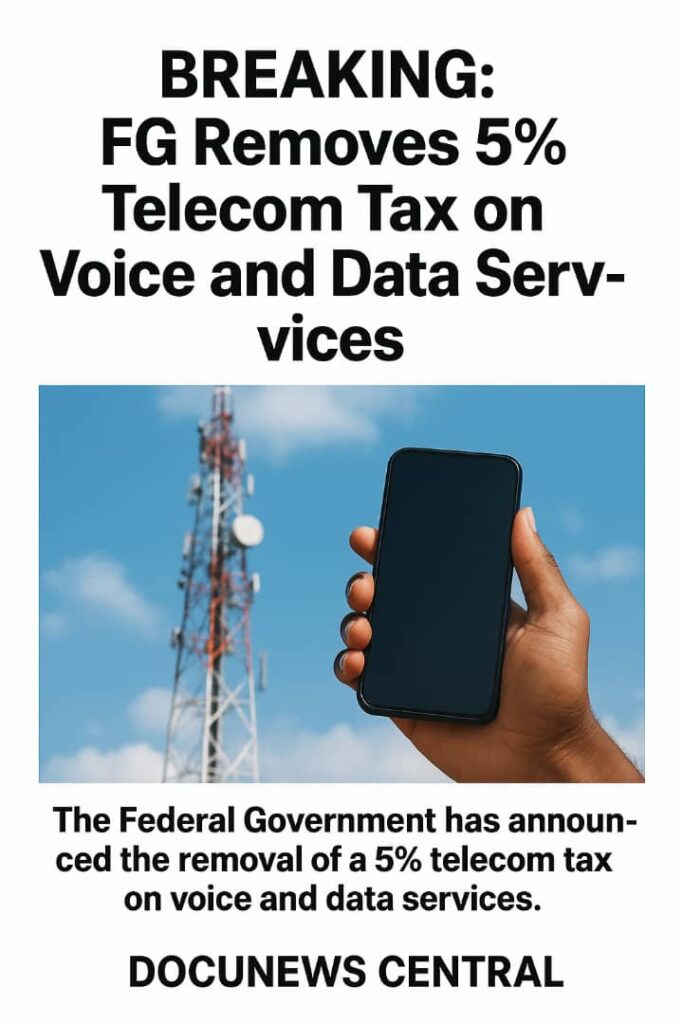
BREAKING: FG Removes 5% Telecom Tax on Voice and Data Services
By Docunews Central
The Federal Government of Nigeria has announced the removal of the 5% telecom tax on voice and data services. This decision was confirmed by officials of the Nigerian Communications Commission (NCC) and supported by the Ministry of Finance. The announcement has generated relief among millions of Nigerians who rely on mobile calls and internet data for daily life and work.
This move is expected to reduce the cost burden on more than 171 million telecom subscribers across the country. It is also seen as a major step in the government’s wider economic reform agenda.
A Major Relief for Telecom Users
The 5% excise duty on telecom services was first introduced under the previous administration. It was designed to generate revenue for the government but was met with strong resistance from industry stakeholders and civil society groups.
For years, Nigerians complained that the cost of voice calls and internet bundles was already high compared to average income levels. The extra levy only added to the burden.
With the new directive, telecom users are expected to feel some relief. While experts warn that the effect may not immediately reflect in tariffs, the removal of the tax has cleared a major source of pressure in the sector.
The Announcement from Government
The Executive Vice Chairman of the NCC, Aminu Maida, confirmed that President Bola Tinubu directed the removal of the 5% telecom tax. He explained that the government reviewed the Finance Act and decided to scrap the duty in order to ease the pressure on citizens and stimulate digital growth.
According to Maida, the decision was part of the president’s focus on reducing multiple taxation in the economy. He said the government wants telecom operators to focus on expanding services rather than passing extra costs to consumers.
Telecom Industry Response
Operators in the telecom sector have welcomed the decision. The Association of Licensed Telecommunications Operators of Nigeria (ALTON) described it as a “positive development.”
They noted that the sector is already facing huge challenges, including high diesel costs, exchange rate pressure, and rising inflation. By removing the 5% excise duty, the government has given the industry a chance to breathe and invest more in infrastructure.
Industry leaders also stated that the decision aligns with the country’s digital economy goals. They believe it will encourage wider internet penetration and support Nigeria’s fast-growing tech ecosystem.
Impact on Ordinary Nigerians
For the average Nigerian, the removal of the telecom tax means one thing: hope for cheaper communication. Families who depend on daily data plans for business, education, and social activities see the decision as a welcome step.
However, consumer rights groups warn that the relief may not be immediate. They argue that operators had already factored in several cost drivers, including fuel prices and exchange rates. This means that even without the tax, call and data rates might not reduce drastically.
Still, Nigerians believe the removal is a victory against unnecessary taxation and a sign that the government is listening to the people.
Civil Society Reactions
Civil society groups have long campaigned against the 5% duty. They argued that it was unfair to tax basic services like communication, which are essential to modern life.
Groups like the Socio-Economic Rights and Accountability Project (SERAP) said the levy violated principles of fairness. They insisted that many low-income families would have been cut off from communication if the tax continued.
Now that the tax has been removed, these groups are urging the government to ensure operators reflect the change in their pricing system.
Economic Experts Weigh In
Economists have described the move as part of the president’s wider push to remove multiple taxes across sectors.
Dr. Henry Boyo, an economic analyst, explained that excise duties are usually applied to luxury goods, not essential services like telecom. He noted that communication is now as vital as electricity and water, and taxing it heavily makes little sense.
Another analyst, Mojisola Adetunji, said the removal will encourage more Nigerians to come online, which will in turn boost e-commerce, fintech, and digital learning.
Background: How the Tax Was Introduced
The telecom tax was introduced under the 2022 Finance Act during the Muhammadu Buhari administration. The idea was to diversify government revenue sources.
The plan was that telecom operators would collect the 5% duty from users and remit it to the Federal Inland Revenue Service (FIRS).
From the beginning, the policy faced stiff opposition. Industry leaders warned that it would hurt growth. Civil groups said it would push millions of Nigerians deeper into poverty.
Even the National Assembly called for its suspension. Despite this, the levy remained in the law until now.
Why the Government Removed the Tax
According to government insiders, the decision to scrap the tax was driven by three main factors:
- Economic hardship: With high inflation and rising fuel costs, Nigerians are struggling to cope. The government wanted to reduce the burden.
- Digital economy goals: Nigeria aims to become a leading digital hub in Africa. Taxing telecoms was seen as a barrier to that vision.
- Industry health: Operators are struggling with rising operational costs. Removing the tax was seen as a way to encourage investment.
What This Means for the Telecom Market
Analysts believe that the removal of the tax could lead to several outcomes:
Wider access: More Nigerians may be able to afford data and voice services.
Industry growth: Operators will have more room to expand infrastructure.
Digital innovation: Startups and tech companies will benefit from cheaper internet.
Economic activity: Cheaper communication can boost trade, education, and services.
Possible Challenges Ahead
Even though the 5% duty is gone, other challenges remain. The telecom sector still faces:
High energy costs for powering base stations.
Forex shortages that make it hard to import equipment.
Security challenges affecting towers and fiber cables.
Experts warn that unless these issues are addressed, the benefits of the tax removal may be limited.
Voices from the Streets
Docunews Central spoke with Nigerians in Lagos, Abuja, and Kano. Many said they welcomed the removal but wanted to see real change in their bills.
“I recharge ₦200 data every day. If the government has removed tax, then the network should give us more value,” said Grace, a student in Abuja.
In Kano, a shop owner named Musa explained: “Communication is part of business. If it becomes cheaper, it helps us. But we want to see action, not just talk.”
Regional and Global Context
Nigeria is not the only country that has faced this debate. In Uganda, the government introduced a tax on social media use, which sparked protests. The policy was later adjusted.
Experts note that in most countries, governments try to support digital access rather than tax it. Nigeria’s decision aligns with global best practices and could improve its reputation among investors.
What Happens Next
The government has confirmed that the Finance Act will be updated to reflect the removal. The NCC will monitor telecom operators to ensure compliance.
Consumer groups are also planning to track whether the change leads to better pricing for subscribers.
The public will be watching closely in the coming weeks to see how the networks respond.
Final Word
The removal of the 5% telecom tax on voice and data services marks a big step in Nigeria’s economic reform drive. It is a win for millions of citizens who have long demanded relief from rising costs.
Whether the impact will be felt immediately or gradually remains to be seen. But one thing is clear: the government has made a choice to put people first in the digital economy.









